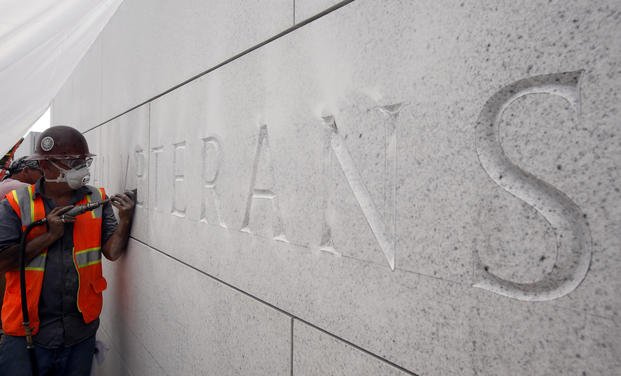In 1990, Maj. Raymond Thomas learned that he was not selected to become a lieutenant colonel. Having been passed over twice, he left the Air Force at 17 years, 10 months and, for his efforts, received $30,000 in separation pay.
More than 30 years later, Thomas, now rated 100% disabled by the Department of Veterans Affairs and receiving disability compensation, is being asked to pay the federal government back, minus taxes.
At 75 years old, living in a recreational vehicle pulled by a Ford F-450, both paid for with his disability pay, Thomas was stunned by a letter from VA saying his $3,737.85 monthly check would not be coming and future payments would be zeroed out or docked.
Read Next: Navy Officer Convicted in Bribery Scheme Tied to Fraudulent Afghan Visas
"I fail to comprehend how or why they intend to cut me off for several months without even negotiating a lesser but [survivable] monthly contribution. I also fail to understand why it took 34 years for VA to come up with this [scheme]. Why now?" Thomas wrote in an email to Military.com shortly after receiving the letter in March.
By law, the VA is prohibited from paying disability compensation to veterans who received voluntary or involuntary separation pay from the Defense Department until the money has been recouped.
While the VA has been required to recover the money since the 1940s, many veterans, such as Thomas, are unaware of the prohibition on concurrent receipt, also known as double dipping.
And some, like Thomas, are finding out decades later.
Thomas, who goes by his call sign Bear, first received disability compensation in 1996, rated at 10%. That $100 a month gradually grew as he subsequently received higher ratings for his cardiovascular and pulmonary illnesses.
In 2018, he was awarded 100% disability but still wasn't made aware that he would be required to reimburse his separation pay.
It wasn't until March, after he had been receiving more than $3,000 a month for six years, that he learned he owed $26,000 to the federal government.
"At the turn of the century, I was at about 40% disability, making an amount where they could have started taking money," he said. "I could have afforded it then."
According to Rand Corporation, roughly 79,000 veterans were required to pay back various types of separation benefits from 2013 through 2020. Last year, 9,298 veterans were required to pay the VA, according to data provided by the VA to Military.com.
Earlier this month, NBC News reported on three of those veterans. Like Thomas, they faced financial hardship as a result of the VA's effort to claw back the money. One, Army veteran Vernon Reffitt, also received $30,000 in the early 1990s to leave the service and learned just recently that he needs to pay the money back.
"That's wrong. You can't just up and take it back," Reffitt told the news outlet.
VA press secretary Terrence Hayes told Military.com there has not been a concerted effort to increase recoupment efforts at VA. Data provided by the department shows that since 2020, roughly 8,500 veterans have faced repayments each year, less than 1% of all VA disability pay recipients.
"It is part of the normal, legally required process during completion of the initial claims application which asks claimants if they received a separation bonus and the amount received," Hayes said.
It appears that the recoupment efforts against Reffitt and Thomas were triggered by secondary claims filed by both veterans. According to NBC, Reffitt's separation pay was found after he filed a claim under the PACT Act.
And according to the VA, Thomas' was related to a claim he filed in 2022. When the former pilot first completed forms for the VA shortly after discharge, he erroneously marked that he had not received separation pay. Subsequent claims did not turn up any evidence of separation pay. But when he filed a claim in 2022, the VA again asked the Defense Department whether Thomas had received separation pay and was told yes, triggering the recoupment, according to a VA response to a congressional inquiry from Thomas' senator, Arizona Democrat Mark Kelly.
Thomas said when he received the letter from the VA in March, he requested a hearing to describe his financial hardship but also offered a compromise -- to pay $500 each month toward recoupment until it was complete.
He again received a letter from VA saying it would take the entire amount and appeared to have either not received the $500 offer or ignored it, Thomas said.
On July 11, a day after Military.com emailed VA regarding the case, Thomas received a phone call from a VA representative saying the department had accepted his $500-a-month repayment plan.
Rep. Ruben Gallego, D-Ariz., and Rep. Gus Bilirakis, R-Fla., sponsored a bill last year that would have eliminated the requirement for VA to recoup separation pay and incentive payments for veterans who receive disability compensation.
The bill was referred to the House Veterans Affairs Disability Assistance and Memorial Affairs Subcommittee but has not been considered by the panel.
In a press release following introduction of the legislation, Gallego said the change is important because the practice of concurrent receipt for decades-old separation pay is "shameful" and "slaps thousands of veterans with unconscionable financial penalties."
Bilirakis described the recoupment as an "injustice."
"This important legislation will provide immediate relief for one group of veterans who have been facing unreasonable financial penalties and unnecessary bureaucratic roadblocks when attempting to access the benefits they have earned," Bilirakis said.
During an interview Wednesday, Thomas said he is relieved that he will continue receiving VA disability compensation and while losing $500 a month would place a "crimp" in his budget, he can handle it.
"I can cut out some of the things in my food budget. I probably should cut out the sweets entirely," he joked.
Related: All Combat-Injured Vets Would Keep Their Full Retirement, Disability Pay Under Proposal











